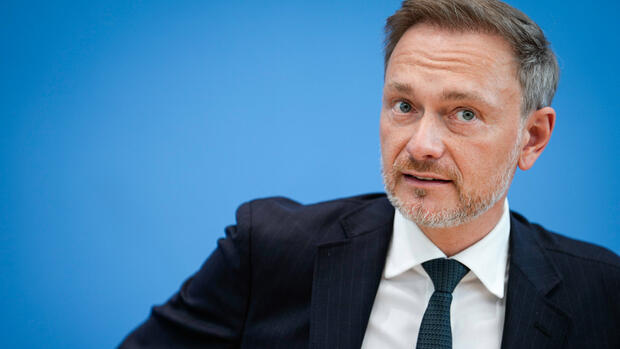Berlin The federal government’s plan to consolidate the federal budget in part at the expense of the contributors is causing considerable resentment in the economy and in social insurance. Employer President Rainer Dulger called the planned transfers, which are likely to lead to higher social security contributions, “anti-social”. The head of the health insurance company DAK, Andreas Storm, criticized that the health budget was becoming “a quarry for household restructuring”.
In order to achieve his savings targets, Federal Finance Minister Christian Lindner (FDP) also wants to save on federal allocations to social security funds at the suggestion of the specialist ministers. This means that the contributors will face rising expenses, at least in the long term – although social security contributions have already broken through the critical 40 percent mark at 40.8 percent of gross income. In the case of childless people, it is even 41.4 percent because of the subsidy for long-term care insurance.
Now Lindner wants to reduce the so-called additional federal subsidy to the pension insurance in the period 2024 to 2027 by 600 million euros annually. With the subsidy, which amounted to around 29.1 billion euros last year, the pension insurance finances benefits such as the mother’s pension or the basic pension surcharge that are not covered by contributions.
According to the German Pension Insurance Association (DRV), the contribution rate will remain stable at 18.6 percent until 2026, despite the planned cuts. After that, however, it will rise faster than previously calculated. The DRV also criticizes the fact that the federal government is again using the pension fund.
Because last year, the government had already abolished four promised special payments of 500 million euros each for the years 2022 to 2025 to the pension fund. With the now planned additional reduction of 600 million euros, the pension insurance will have 1.1 billion euros less available in the coming year.
Read more about pension insurance here
“Constantly increasing tax financing for social insurance, which absorbs the foreseeable increases in contribution rates, was never an option,” says Martin Werding. This is now becoming clear much faster than expected.
“In the current savings discussion, however, the financial flows are partially reversed at the expense of the contributors,” said the Bochum economist to the Handelsblatt. For example, the reduction in the additional subsidy runs counter to the principle that the federal pension insurance system should actually reimburse all non-insurance benefits.
Long-term care insurance is particularly hard hit, as at the beginning of the month there had just been a sharp increase in the contribution rate. Since the federal subsidy of one billion euros has been canceled for the coming year, Health Minister Karl Lauterbach (SPD) wants to suspend the allocation to the care provision fund. This is actually intended to cushion the necessary contribution rate increases with a financial reserve if the baby boomer cohorts with a high birth rate become in need of care.
>> Read here: Interview with Federal Minister of Finance Lindner – “We can quickly end up in the second division”
“While the entry into partial capital cover has been decided in pension insurance, this is being reduced again in long-term care insurance,” criticized DAK boss Strom. This contradictory approach by the federal government could not be conveyed.
Overall, Lauterbach’s department is most affected by the cut in federal funds. Instead of raising the federal subsidy for non-insurance services as promised in the coalition agreement and finally paying cost-covering contributions for the care of people receiving basic income, the federal government is cutting back on health insurance, criticized the chairman of the Association of Substitute Health Insurance Funds (VDEK), Uwe Klemens.
Read more about health insurance here
As a result, Health Minister Lauterbach announced that the contribution rates, which were already at a record average of 16.2 percent, would be increased again in the coming year.
However, economist Werding also shows understanding for the planned cuts: “In health and long-term care insurance, measures that should support the systems in the crisis are being withdrawn,” he says. This is “a modern normalization”, even if the funds are particularly scarce there at the moment because the services have been expanded without taking the financial situation into account.
Minister of Labor Hubertus Heil (SPD) also wants to spare the federal budget at the expense of the contributors. After all, from 2025 onwards, labor market integration aids such as introductory training for under 25-year-old recipients of citizen benefits should no longer be financed by taxpayers, but by those who pay contributions to unemployment insurance.
According to the Federal Employment Agency (BA), there are currently 695,000 recipients of citizen benefits between the ages of 15 and 24. Additional spending is likely to make it more difficult for the BA to rebuild the reserve deemed necessary to cushion future labor market crises.
Criticism of the project comes from the opposition: “In order to save tax money when promoting young people, tasks are being postponed so that they will be paid for in future by contributors to unemployment insurance,” says the labor market and social policy spokesman for the Union faction, Stephan Stracke (CSU ). This should permanently save 900 million euros in the federal budget.
>> Read here: Second stage of citizen income reform in force
Stracke criticized the switchboard of tax-financed burdens on the contributors as nothing more than a hidden tax increase through the back door. “In the coming years, the contribution rates for social security will go through the roof unchecked.”
Crafts President Jörg Dittrich warns against going too far: further increases in social security contributions would be a great danger for the labour-intensive trades, because their services would simply be unaffordable in one place or another, he told the Handelsblatt. “The financing of our social systems must be put to the test. Unfortunately, no one dares to go there – probably also out of consideration for the upcoming elections.”
More: Commentary on the new federal budget: The hard decisions are yet to come
